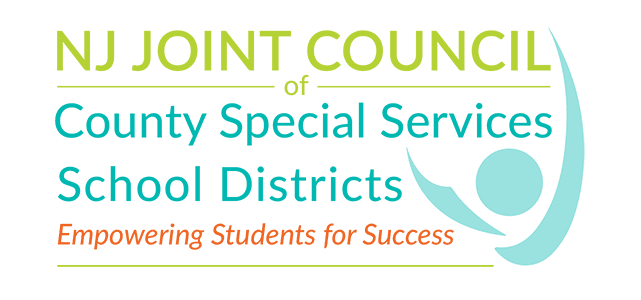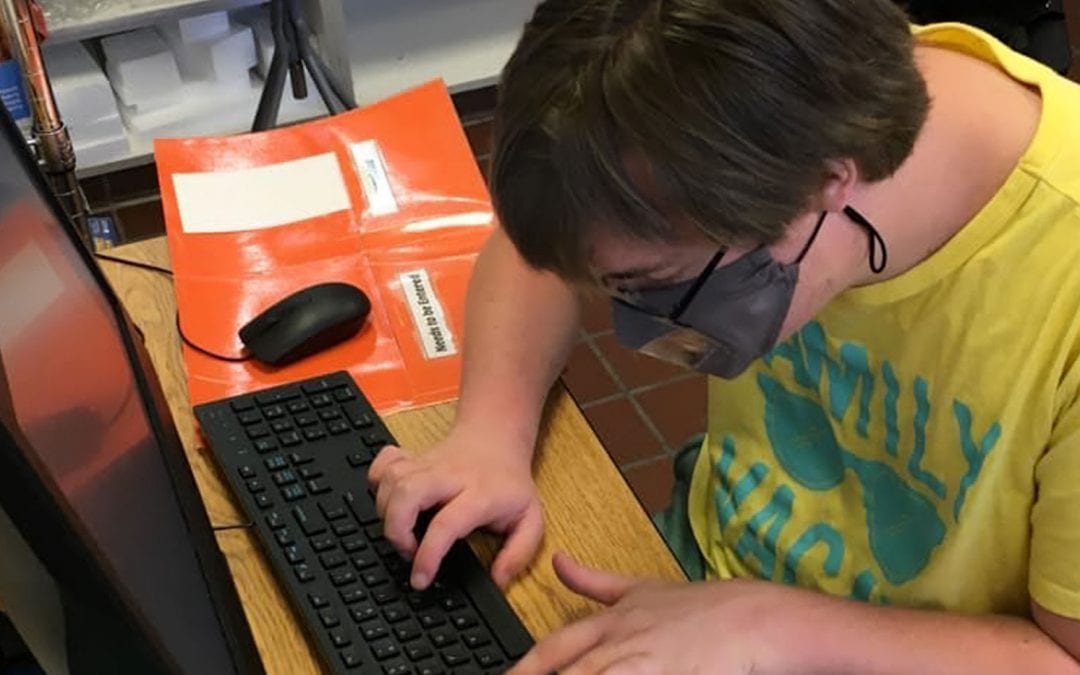Career and Technical Education (CTE) Month presents an opportunity each February to highlight the benefits of skills-oriented learning. Prior to the pandemic, most students in New Jersey’s county special services school districts strengthened their employability skills at job sites in their communities. Today, districts are rising to the challenge of training students for employment and increased independence in classroom settings and virtual environments until it’s deemed safe to reconnect them with area employers.
Burlington County Special Services School District adapted to remote learning for the 18-21-year-old students in its Transitions Program so thoughtfully, despite a tight timeframe last spring, that it earned the New Jersey School Boards Association’s (NJSBA) School Leader Award for an exemplary program. The Transitions Program will soon be featured in an issue of School Leader magazine.
The Transitions team practices person-centered thinking and planning, taking each student’s values, strengths and abilities into consideration to help him or her achieve the highest level of independence upon program completion. That individualized approach helped earn the program the School Leader Award.
Prior to the closure of New Jersey schools in March 2020, BCSSSD staff contacted all parents with a survey to discuss the individual needs and learning style of their student. Teachers prepared for the shift by compiling worksheets, Internet-based activities and pre-vocational skills kits, all personalized to accommodate each student’s technology access, ability, at-home support system and, most central to the planning, each student’s Individualized Education Program (IEP) goals and objectives.
The consistency of the weekly schedule established by each teacher helped students settle into a new routine and realize new expectations. These schedules included assignments sent on Monday for the week, daily chore and work skills charts to complete, daily physical education and Google Meets. “Some parents even remarked that their student was demonstrating new levels of independence and responsibility as a result of having more authority over managing his or her day,” said Dr. Christopher Nagy, BCSSSD superintendent.
Close collaboration with families sparked innovative ideas for student learning, with one family creating fake gift cards for their student to sort by store name in a mock gift card holder and another family gathering CDs and DVDs for their student to practice cleaning and sorting them, resembling a library task.
A Learning Lab Like No Other
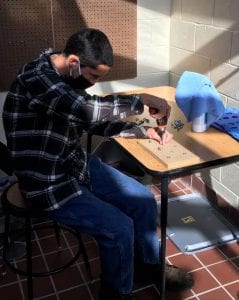
In Burlington County Special Services School District’s new Work-Based Learning Lab, a student in the district’s Transition Program learns new skills in a simulated work setting.
When students returned this school year for in-person learning, BCSSSD developed its own creative approach to give students hands-on learning experiences through a new Work-Based Learning Lab. This idea was initially proposed by a district Board Certified Behavior Analyst (BCBA), Kathie McMahon, who had a vision that Transitions would offer simulated and differentiated work activities to mirror the skills needed in the program’s previously approved work-based learning business sites. This vision was expanded to include ancillary connections like simple household repairs and activities of daily living based on input from young adults who were encouraged to advocate for themselves and suggest skills they would like to learn.
The hands-on learning takes place in simulated work settings that include computer technology, home engineering, processing and production, retail merchandising, hospitality services, consumer food services, and business marketing. Each setting features a comprehensive array of tasks that are differentiated to individual skills and abilities, providing horizontal and vertical growth for BCSSSD’s young adults.
“A strong focus on preparing students to demonstrate industry-recognized skills is an essential part of our Lab,” said Dr. Lisa J. English, BCSSSD assistant superintendent of curriculum and instruction. “In addition, a student-centered approach to learning and classroom instruction allows our staff to consistently incorporate a balance of soft-skills training and real-world application as a part of the everyday learning experience at the Transition Campus.”
A Resourceful Approach to Hands-on Learning
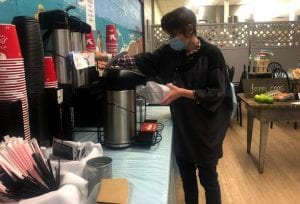
A student in the Community Based Instruction program at Cape May County Special Services School District takes advantage of a work-based learning opportunity right on campus.
At Cape May County Special Services School District, students in the Community Based Instruction program also remain on campus for work-based learning. Instead of learning through simulations, they have opportunities to take on a job that supports their school community, whether that’s through laundry services, working in the district’s Back Porch Restaurant, growing and harvesting crops, or assisting the facilities staff.
“Our students are taking full advantage of work-based learning opportunities right here within our district until it is safe for them to return to real-world jobs,” said CMCSSSD Assistant Principal Nicholas Bailey. “We know how important it is for our students to practice skills in a real-world scenario.”
Bailey and Assistant Superintendent Jamie Moscony are looking to expand post-pandemic work-based learning opportunities with Cape Resorts/Congress Hall and the Lewes Ferry. They recently presented to their local Cape May County Chamber to recruit additional employers to partner with the district to employ students in the future.
“When our students are on the job, they are often interviewing for a more permanent position by demonstrating their work ethic and abilities,” said Bailey. “It’s important that we work to strengthen our partnerships to ensure that our students continue to have chances to explore careers, hone their skills and network.”
Endless Resources and Opportunities Online
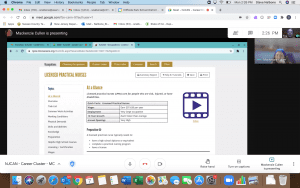
The Transition team at Bergen County Special Services School District helps a student explore online resources offered through the New Jersey Career Assistance Navigator (NJCAN).
The Transition team at Bergen County Special Services School District is connecting some of its young adult students with area employers right now – without sacrificing safety precautions. The district has started virtual internships, during which students work with mentors to learn about specific jobs within companies, and they have even collaborated with teams on special projects. Companies participating include Valley Medical Center, Compass Realty, Care One, Montclair Art Museum and many others. “These experiences have helped our students develop and enhance their communication, problem-solving, self-management and leadership skills,” said Grisel Espinosa, supervisor of Transition Services.
Bergen County SSSD has also addressed the pre-vocational needs of students during this challenging period by creating a series of on-line lessons, videos and curriculum options that have allowed students to continue learning about career options they may want to consider in the future.
The district has also tapped into resources available through the New Jersey Career Assistance Navigator (NJCAN) and Applied Educational Systems (AES). These online tools offer interest inventories, career awareness lessons, and opportunities to explore occupational areas through the use of video presentations. Bergen County students have also had opportunities to learn about other important pre-vocational skills by participating in mock interviews and virtual job tours. Students work directly with job coaches and job developers during these sessions.
“When the pandemic is behind us, we will not leave all the new online resources we’ve discovered and innovative on-campus trainings we’ve developed behind us,” said Dr. Howard Lerner, superintendent of Bergen County Special Services School District and chairman of the New Jersey Joint Council of County Special Services School Districts. “If anything, our programs to prepare students for that transition from school to adulthood will grow even stronger and more effective. Students will gain increased technology skills, have opportunities to explore more career options virtually and in on-campus labs, and revisit online resources independently to have even more control over their futures.”
